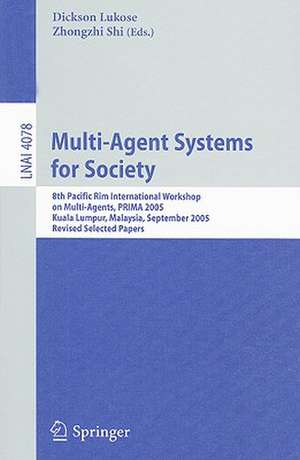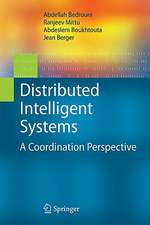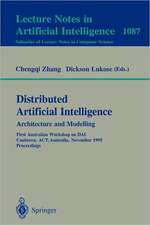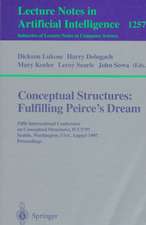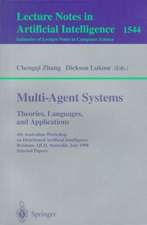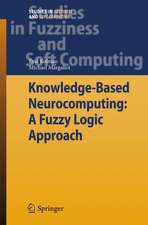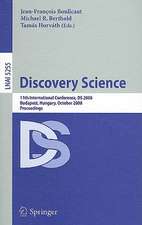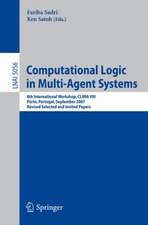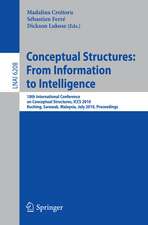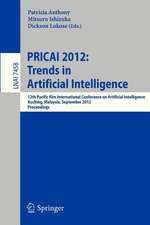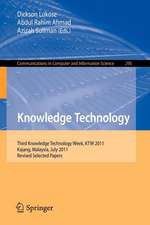Multi-Agent Systems for Society: 8th Pacific Rim International Workshop on Multi-Agents, PRIMA 2005, Kuala Lumpur, Malaysia, September 26-28, 2005, Revised Selected Papers: Lecture Notes in Computer Science, cartea 4078
Editat de Dickson Lukoseen Limba Engleză Paperback – 20 iul 2009
Din seria Lecture Notes in Computer Science
- 20%
 Preț: 1061.55 lei
Preț: 1061.55 lei - 20%
 Preț: 307.71 lei
Preț: 307.71 lei - 20%
 Preț: 438.69 lei
Preț: 438.69 lei - 20%
 Preț: 579.30 lei
Preț: 579.30 lei -
 Preț: 410.88 lei
Preț: 410.88 lei - 17%
 Preț: 427.22 lei
Preț: 427.22 lei - 20%
 Preț: 596.46 lei
Preț: 596.46 lei - 15%
 Preț: 448.04 lei
Preț: 448.04 lei - 20%
 Preț: 353.50 lei
Preț: 353.50 lei -
 Preț: 389.49 lei
Preț: 389.49 lei - 20%
 Preț: 309.90 lei
Preț: 309.90 lei - 20%
 Preț: 645.28 lei
Preț: 645.28 lei - 20%
 Preț: 763.23 lei
Preț: 763.23 lei - 15%
 Preț: 580.46 lei
Preț: 580.46 lei - 20%
 Preț: 310.28 lei
Preț: 310.28 lei - 20%
 Preț: 655.02 lei
Preț: 655.02 lei - 20%
 Preț: 1183.14 lei
Preț: 1183.14 lei - 20%
 Preț: 340.32 lei
Preț: 340.32 lei -
 Preț: 449.57 lei
Preț: 449.57 lei - 20%
 Preț: 591.51 lei
Preț: 591.51 lei - 18%
 Preț: 938.83 lei
Preț: 938.83 lei - 20%
 Preț: 337.00 lei
Preț: 337.00 lei - 20%
 Preț: 649.50 lei
Preț: 649.50 lei - 20%
 Preț: 607.40 lei
Preț: 607.40 lei - 20%
 Preț: 1414.79 lei
Preț: 1414.79 lei - 20%
 Preț: 1024.44 lei
Preț: 1024.44 lei - 20%
 Preț: 583.40 lei
Preț: 583.40 lei - 20%
 Preț: 453.32 lei
Preț: 453.32 lei - 20%
 Preț: 575.49 lei
Preț: 575.49 lei - 20%
 Preț: 1075.26 lei
Preț: 1075.26 lei - 20%
 Preț: 585.88 lei
Preț: 585.88 lei - 20%
 Preț: 825.93 lei
Preț: 825.93 lei - 17%
 Preț: 360.20 lei
Preț: 360.20 lei - 20%
 Preț: 763.23 lei
Preț: 763.23 lei - 20%
 Preț: 340.32 lei
Preț: 340.32 lei - 20%
 Preț: 504.58 lei
Preț: 504.58 lei - 20%
 Preț: 369.13 lei
Preț: 369.13 lei - 20%
 Preț: 580.93 lei
Preț: 580.93 lei - 20%
 Preț: 343.62 lei
Preț: 343.62 lei - 20%
 Preț: 350.21 lei
Preț: 350.21 lei - 20%
 Preț: 583.40 lei
Preț: 583.40 lei - 20%
 Preț: 583.40 lei
Preț: 583.40 lei - 15%
 Preț: 438.59 lei
Preț: 438.59 lei - 20%
 Preț: 341.95 lei
Preț: 341.95 lei - 20%
 Preț: 238.01 lei
Preț: 238.01 lei - 20%
 Preț: 538.30 lei
Preț: 538.30 lei
Preț: 341.15 lei
Preț vechi: 426.44 lei
-20% Nou
Puncte Express: 512
Preț estimativ în valută:
65.28€ • 68.16$ • 53.90£
65.28€ • 68.16$ • 53.90£
Carte tipărită la comandă
Livrare economică 15-29 aprilie
Preluare comenzi: 021 569.72.76
Specificații
ISBN-13: 9783642033377
ISBN-10: 3642033377
Pagini: 428
Ilustrații: XIII, 412 p.
Dimensiuni: 155 x 235 x 22 mm
Greutate: 0.66 kg
Ediția:2009
Editura: Springer Berlin, Heidelberg
Colecția Springer
Seriile Lecture Notes in Computer Science, Lecture Notes in Artificial Intelligence
Locul publicării:Berlin, Heidelberg, Germany
ISBN-10: 3642033377
Pagini: 428
Ilustrații: XIII, 412 p.
Dimensiuni: 155 x 235 x 22 mm
Greutate: 0.66 kg
Ediția:2009
Editura: Springer Berlin, Heidelberg
Colecția Springer
Seriile Lecture Notes in Computer Science, Lecture Notes in Artificial Intelligence
Locul publicării:Berlin, Heidelberg, Germany
Public țintă
ResearchCuprins
Keynote Papers.- Application of Information Processing Technology by Multiagent Simulation.- Cognitive Architectures and Multi-agent Social Simulation.- Full Papers.- A Co-operative Intelligent Assisting Agent Architecture for Web Searching and Desktop Management.- Prisoner’s Dilemma Game on Network.- Addressing Constraint Failures in Agent Interaction Protocol.- Reasoning about Success and Failure in Intentional Agents.- Agent-Base Workflow Management System Architecture – An Example on Conference Info System.- Diverse Applications of an Automated Argument System Based on the Logic of Multiple-Valued Argumentation.- Dynamic Interaction Protocol Load in Multi-Agent System Collaboration.- Towards a Component-Based Architecture for TeleAgents.- Development of a Lightweight Middleware Technologies Supporting Mobile Agents.- The Roles of Active Perception in Intelligent Agent Systems.- Fairness in Cooperating Multi-agent Systems – Using Profit Sharing as an Example.- Risk Strategies and Risk Strategy Equilibrium in Agent Interactions Modeled as Normal Repeated 2 ×2 Risk Games.- A Crowd Model for Emergency and Panic Situations: Structure, Characteristics and Behaviours.- Learning the Structure of Utility Graphs Used in Multi-issue Negotiation through Collaborative Filtering.- ARTISTE: Agent Organization Management System for Multi-Agent Systems.- Sensor Management Model Using Multi-agent in Small-Area Sensor Networks.- Conflict Resolution Method for Multi-context Situation.- Multi-auction Approach for Solving Task Allocation Problem.- Using Classification Learning in Companion Modeling.- Modeling a MultiAgent Mobile Robotics Test Bed Using a Biologically Inspired Artificial Immune System.- Deploying Multi-Agents for Intelligent Aspect-Oriented Web Services.-Multi-Agent System Using G-XMDR for Data Synchronization in Pervasive Computing Environments.- An Interval-Based Knowledge Model and Query Language for Temporal Information.- A Petri-Net-Based Modeling Framework for Automated Negotiation Protocols in Electronic Commerce.- Agent Based Interaction Model for Electronic Health Record System.- Implementation of MedVI Agent a Medical Vocabulary Interpreter for Medical Agents.- Multi-agent Cooperation: A Description Logic View.- Enhancing Bidding Strategies in CDAs by Adaptive Judgement of Price Acceptability.- Dealing with Objectives in a Constraint-Based Extension to AgentSpeak(L).
Textul de pe ultima copertă
This book constitutes the thoroughly refereed post-conference proceedings of the 8th Pacific Rim International Workshop on Multi-Agents, PRIMA 2005, held in Kuala Lumpur, Malaysia, in September 2005.
The 29 revised full papers and 2 keynote papers presented were carefully reviewed and selected from numerous submissions. The papers address many current topics in multi-agent research and development, ranging from theoretical and methodological issues to various applications in different fields.
The 29 revised full papers and 2 keynote papers presented were carefully reviewed and selected from numerous submissions. The papers address many current topics in multi-agent research and development, ranging from theoretical and methodological issues to various applications in different fields.
